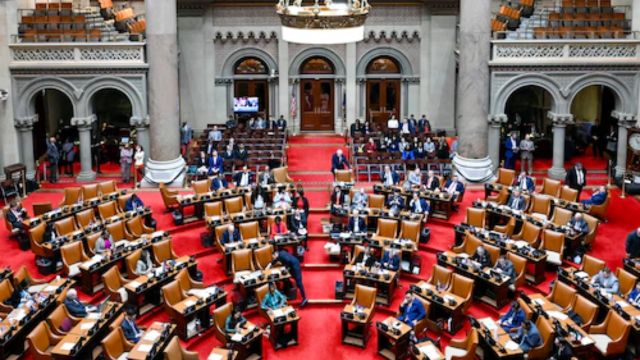Five Laws Going Into Effect for New York in 2025
A burst of legislation has culminated in Gov. Kathy Hochul signing almost 700 measures into law, affecting paid family leave, insulin costs, and even restaurant reservations, among other things.
As we leave 2024 behind, here are five laws that will impact New Yorkers’ lives in 2025.
Paid prenatal leave takes effect
Ms. Hochul’s budget this year included a provision that expanded the state’s paid family leave law: Beginning January 1, employers must provide at least 20 hours of paid time off for pregnant employees to attend associated medical visits such as sonograms.
New York looks to be the first state to provide this type of time off from work. Ms. Hochul argued for the program, citing research that show moms and children have better health outcomes when they receive prenatal care.
This benefit is separate from other types of leave required by the state and federal governments. Businesses of all sizes must provide it, and they are barred from requiring qualified employees to provide medical information when requesting time off.
“No one should ever be afraid to seek medical care because of the costs or time away from work,” Governor Hochul said in an April statement announcing the budget agreement.
Insulin on insurance will be cheaper
Another reform that goes into effect on January 1 is the elimination of co-pays for insulin covered by state-regulated health insurance plans. This expands on a government regulation that limited the cost of insulin for Medicare recipients to $35 per month.
Approximately half of all states limit the cost of insulin, but New York is the first to remove co-pays. The American Diabetes Association estimates that approximately 1.8 million adult New Yorkers have the disease, and Ms. Hochul stated in April that she expected the legislation to save New Yorkers $14 million by 2025.
“We know that an individual’s ability to manage diabetes and prevent life-threatening complications is directly tied to their ability to access the medication they so desperately need,” Monica Billger, the American Diabetes Association’s state government affairs director, said in April.
Restaurant reservations will be (slightly) easier to get
Landing a prime reservation at a popular restaurant has long been considered a New York City sport. However, in recent years, it has gotten much more difficult as a secondary market has thrived, with reservations for two at popular restaurants selling for hundreds of dollars.
To prevent this, a new regulation going into effect in February will prohibit the practice of selling reservations without the restaurant’s approval.
According to The New York Times, bots take the majority of reservations, which can cause havoc for eateries. Businesses have struggled to acquire a clear image of how many diners they will serve on a nightly basis, and their bottom lines have suffered when reserved tables remain empty.
Pablo Rivero, CEO of Resy, a reservation service, told The Times that the new regulation was “a major step forward in the industry’s effort to protect restaurants and diners from reservation fraud.”
It will still be difficult to acquire a table at Via Carota in the West Village, with the possibility of seeing Taylor Swift, but as Ms. Hochul stated in her approval memo, this law will “level the playing field.”
Canceling your gym membership will also be easier
New Year’s resolutions include eating better and working out more. Perhaps it entails signing up for a gym membership or renewing a monthly contact with a neighboring yoga class.
When reality strikes, an updated law will make cancellations easier and more open. When you notify a health club that you wish to return to loafing, the cancelation and any reimbursements must be processed within 10 business days.

The amended legislation, which takes effect in February, also widens the cancellation options that fitness clubs must provide.
“This bill ensures that we empower New Yorkers to make the best choices for their health and well-being without being locked into contracts that no longer serve their needs,” said State Senator Roxanne J. Persaud, who sponsored the legislation.
Fashion models will have more protections
In June, there will be significantly greater control and labor regulations for models, influencers, and fashion workers in New York.
Modeling management firms have benefited from an exception that permits them to avoid some laws including timely payment and contract exclusivity.
The measure mandates modeling firms to work in their client’s best interests, establishes means for reporting harassment, and limits how photographs of people can be modified using artificial intelligence software.
The law, which was first enacted in 2022, also limits the fees that management businesses can charge.
The measure, sponsored by State Senator Brad Hoylman-Sigal and Assemblywoman Karines Reyes, will address “the legal loophole by which management companies escape accountability and create basic protections for fashion’s creative workforce.”

